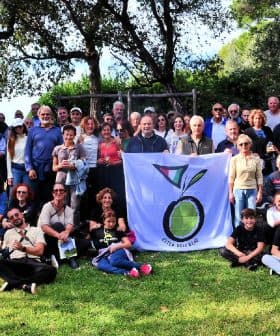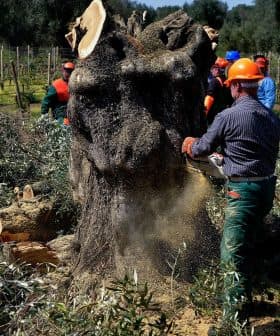Producers and Exporters Eagerly Await Ratification of EU-Mercosur Deal
The trade deal will eliminate tariffs on both Mercosur and E.U. exports and creates the world's largest bloc of olive oil consumers and producers.
The recently signed free trade agreement between Mercosur and the European Union, once fully implemented, will create a common market of 780 million people, benefiting olive oil producers and exporters on both sides of the Atlantic by eliminating tariffs and improving trade convenience. While the deal is expected to boost olive oil exports from Europe to Mercosur countries like Brazil, concerns remain among Brazilian producers about competition from imported oils and potential loss of competitiveness in the market.
Once ratified and fully implemented, the recently signed free trade agreement between the Mercosur and the European Union will create a common market of 780 million people.
Olive oil producers and exporters on both sides of the Atlantic are eagerly awaiting the cessation of tariffs.
“The EU-Mercosur trade deal represents good news for the olive oil sector,” Anna Cane, president of the Italian Association of the Olive Oil Industry (Assitol), told Olive Oil Times. “In 15 years our exports to Mercosur countries will be completely liberalized.”
This measure helps to make trade between Europe, Brazil, Argentina, Paraguay and Uruguay more convenient.
There is currently a 10 percent tariff levied against most E.U. olive oils imported to the Mercosur, which is composed of Argentina, Brazil, Paraguay and Uruguay.
“Gradually tariffs on olive oil will reduce, until their definitive removal,” she said. “This measure helps to make trade between Europe, Brazil, Argentina, Paraguay and Uruguay more convenient.”
“There are great markets, with many consumers interested in Italian food products,” she added.
See Also:Olive Oil Trade NewsWhile olive oil consumption remains largely stagnant in countries such as Italy and Spain, the appetite for olive oil is growing steadily in the Mercosur, which is a deficit market for the product, according to Juan Vilar Hernández, an industry analyst, strategic consultant and permanent professor at the University of Jaén.
“This is a deficit market for both olive oil and table olives, which have completely abolished tariffs in the case of stable olive oil,” Vilar Hernández told Olive Oil Times. “Therefore, the [European] olive oil processing sector significantly improves its margin.”
Nowhere is this deficit more evident than in Brazil. Since the end of a devastating financial crisis in 2015, consumption and imports have risen steadily. According to data from the International Olive Council, Brazilians consumed 50,000 tons of olive oil in the 2015/16 crop year. By 2018/19, this figure had risen to 78,000 tons, a record high.
Brazil currently has a very specific trade deal with Portugal, which provided nearly 60 percent of the country’s olive oil imports in 2018. Vilar Hernández reckons that as tariffs come down, Spanish producers will be able to enter the market more easily.
“In this case, the abolition of the old tariffs… will help oil, especially from Spain,” he said.
For Brazilian consumers, the deal comes as good news. The eventual elimination of tariffs means that more high quality extra virgin olive oil will enter the market and continue to drive down prices.
However, Sandro Marques, author of the Guide to Brazilian Olive Oil and editor of Um Litro de Azeite, predicts that the landmark trade deal will hurt the country’s fledgling olive oil production sector.
“Our producers are worried about the deal but nothing concrete can be said yet,” Marques told Olive Oil Times. “One of the biggest fears is that good quality oil arrives at lower prices and Brazilian oil loses competitiveness.”
Our production is small but it’s still a hard task for producers to sell it, so good quality imported oils could be a real problem.
Ibraoliva, an organization that supports olive growers and oil producers in Brazil, is already scrambling to figure out how the free trade deal will impact producers. Officials from the organization have scheduled meetings with the Ministry of Agriculture to discuss what may happen.
“Our production is small but it’s still a hard task for producers to sell it, so good quality imported oils could be a real problem,” Marques said. “And it’s important to keep in mind that as more groves reach their maturity, our production tends to increase.
However, the sense of foreboding among Brazilian producers is not shared by their neighbor to the southwest. Argentina is poised to be one of the biggest benefactors of the free trade deal.
Tariffs on its exports to the European Union as well as quotas imposed on those exports will be dropped upon ratification. European olive oil imports are also unlikely to impact Argentina’s trade with its neighbors.
According to data from the International Trade Center, nearly 40 percent of Argentina’s olive oil exports went to Spain in 2018. The year before, on the back of a record-breaking harvest, more than 35 percent of exports were destined to E.U. countries.
“Any agreement benefits both parties,” Frankie Gobbee to co-founder and director of the Argentina Olive Group, told Olive Oil Times. “This agreement, especially because virgin olive oil, which is the one we produce most in Argentina, can be exported to the European Community from year one.”
Previously, Argentina had an agreement with Spain that allowed them to export some olive oil to the country duty-free in order to be blended and re-exported by Spain. Now Argentine exporters will have far easier access to other countries. Of particular interest are some northern European countries, where consumption is increasing more quickly than in the Mediterranean basin.
“I believe that the agreement will facilitate and improve the image of our country as a producer of extra virgin in the counter-season, to improve the quality of the Mediterranean oils at a time of the year when they do not have fresh extra virgin olive oil,” Gobbee said.
As Argentine producers eye the Spanish market, the same is happening on the other side of the Atlantic. Argentina has traditionally been a very protectionist market, which will be newly opened up by the trade deal.
Rafael Pico Lapuente, the director of the Spanish Association of the Olive Oil Exporting Industry and Commerce (Asoliva), told Olive Oil Times that he does not expect much to change with the implementation of the deal, except in the case of Argentina.
“Obviously any commercial agreement is for the benefit of all and therefore of the international market,” he said. “Exports will increase but not noticeably. They could increase somewhat more in Argentina.”
Before the deal comes fully into force, it needs to be ratified in the European Parliament, 28 European capitals and four Mercosur capitals.
While there is opposition to the deal in some E.U. countries, it is still widely expected to pass muster, creating a free market in which 54 percent of the world’s olive oil is consumed and 71 percent of it is produced.









